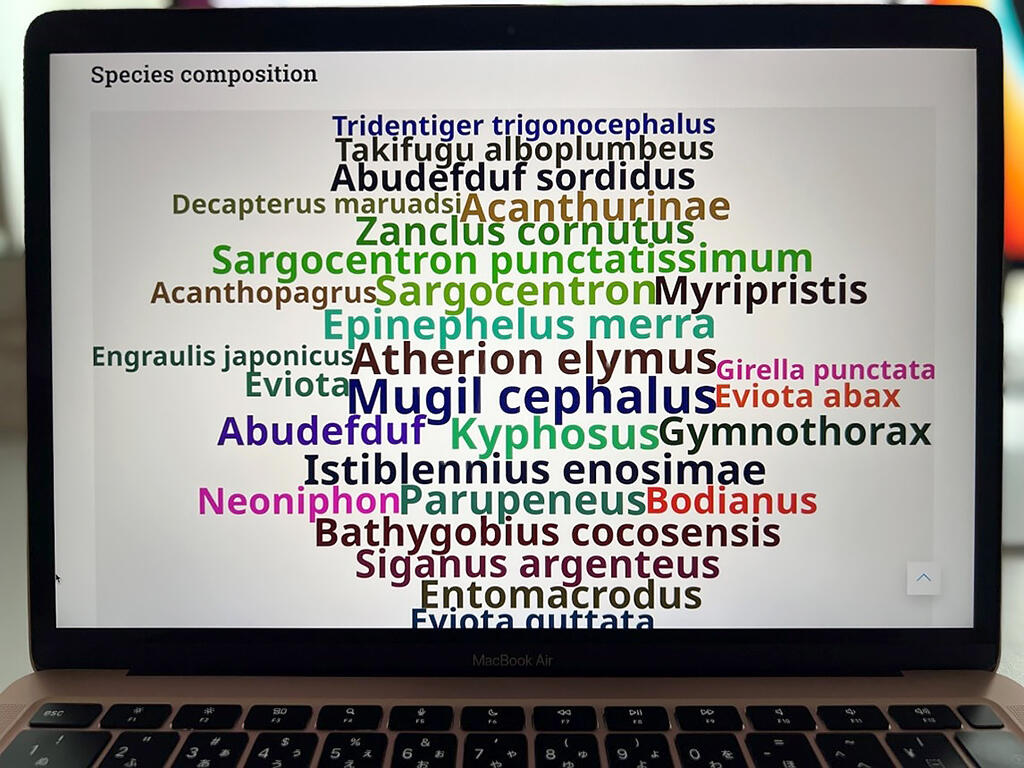Dr. Michio Kondoh of the Graduate School of Life Sciences, Tohoku University, Nippon Yusen Kabushiki Kaisha, Kinkai Yusen Kaisha Ltd., the local government of Minamisanriku Town, Miyagi Prefecture, and Earthwatch institute, Japan, together released ANEMONE DB (https://db.anemone.bio/), a database that compiles the results of fish surveys conducted by the All Nippon eDNA Monitoring Network (ANEMONE), a biodiversity observation network using environmental DNA, on June 2nd, 2022. The database has been released as open data available to anyone who registers. This is the first example of the development and publication of a database of environmental DNA survey data. The database serves to visualize changes to ecosystems over a wide area, and use is expected from a wide range of domains including academia and industry.

The database stores and organizes environmental DNA analysis from fish surveys carried out 4,298 times since 2017 in 861 rivers and seashores throughout Japan by researchers and approximately 200 volunteer citizens in the form of big data. Data from 77 of the surveyed locations represent fixed-point observations. Moving forward, data from research carried out in 2015 will also be added, as will data from future surveys.
The database can be searched by the fishes academic name, collector and other parameters. Furthermore, survey locations can be selected from a map of Japan to review the survey results for that location. The arrangement of the data is designed to be intuitive, with fish found at each location listed in order of size according to the detected DNA. Meanwhile, users can click on the name of a fish to search for other locations where the same fish was found. The data can also be extracted in TSV file format for research purposes.

Provided by Tohoku University
At a press conference held on the day of the release, Dr. Kondoh noted that, "Through the ANEMONE database, we hope to create a new society in which we as a society develop together with nature. There is focus on the concept of being nature positive throughout the world as an important issue to address after we achieve carbon neutrality. Through collaboration between industry, the government, and academia, we will solve the problems facing society, such as those involved with nature, and achieve nature positive industrial development.
Under the leadership of Dr. Kondoh, and through collaboration with the University of Tsukuba and the Kazusa DNA Research Institute, activities including environmental DNA research have been carried out since 2019 with participation by universities, public organizations, local governments, and companies throughout Japan. The predecessor to this program was the environmental DNA survey carried out on shorelines throughout Japan by Dr. Kondoh through JST's CREST program starting in 2017.
Since last year, Nippon Yusen Kabushiki Kaisha (NYK) has been participating in seawater sampling along its Japan-Australia routes. The company plans on continuing to participate this year, and if necessary, is willing to collect water along all of its operating routes throughout the world. They are even considering the development of an automated water sampling system for this purpose.
Meanwhile, Kinkai Yusen, a subsidiary of NYK, has been participating from the summer of last year. The company's vessel Mashu, operating regularly between the ports of Hitachinaka (Ibaraki Prefecture) and Tomakomai (Hokkaido), will begin collecting water samples once per month. These two companies collect roughly 30 liters of water during each sampling, which they then forward to Hokkaido University.
Meanwhile, the Earthwatch Institute, Japan has been participating in environmental DNA sampling since 2020 through cooperation between industry, academia, the government, and citizen volunteers. They plan to carry out a simultaneous survey in 50 locations throughout Japan this summer with 100 citizen volunteers, and they intend to expand that to 100 locations next year.
The community of Minamisanriku Town plans to use the database to track current fish migration patterns and plan measures in light of the changes to those patterns observed in recent years due to the effects of global warming.
Meanwhile, the network behind the database newly established the ANEMONE Consortium on June 1 to strengthen the operational formation for the database and educate society about its principles. The three goals of the Consortium, based on the shared philosophy to "achieve a society that coexists with nature by utilizing high level biodiversity information," are (1) initiatives to achieve nature positivity, (2) the development and spreading of environmental DNA technology, and (3) the establishment of the ANEMONE database observation network.
Currently, 13 companies, organizations, and individuals participate in the Consortium, and they intend to continue calling for new patrons and supporters in order to work with a large number of companies and organizations to expand their field of activities. Their goal is to expand to 100 companies and organizations by March 2023.
The loss of biodiversity due to human activity is increasing, but the cost of biological surveys that are dependent on trapping carried out to date are expensive, and a method to more efficiently survey a larger area is required. The environmental DNA technology that has been developing in recent years is expected to address this need.
This article has been translated by JST with permission from The Science News Ltd.(https://sci-news.co.jp/). Unauthorized reproduction of the article and photographs is prohibited.




